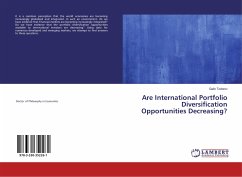
Opportunities and Challenges of Banking Industry
Ethiopian Outlook
Versandkostenfrei!
Versandfertig in 6-10 Tagen
39,99 €
inkl. MwSt.

PAYBACK Punkte
20 °P sammeln!
The financial system of Ethiopia is very underdeveloped. There is no stock exchange and of the banks that exist, three are state owned and dominate the sector. There are no foreign banks in the country, and the system remains isolated from the effects of globalization while policy makers fear that liberalization will lead to loss of control over the economy. The government controls interest rates and sets them below the high inflation rate. Corruption, though strictly sanctioned, remains a concern. The National Bank of Ethiopia is the country s central bank. The state owned Commercial Bank of ...
The financial system of Ethiopia is very underdeveloped. There is no stock exchange and of the banks that exist, three are state owned and dominate the sector. There are no foreign banks in the country, and the system remains isolated from the effects of globalization while policy makers fear that liberalization will lead to loss of control over the economy. The government controls interest rates and sets them below the high inflation rate. Corruption, though strictly sanctioned, remains a concern. The National Bank of Ethiopia is the country s central bank. The state owned Commercial Bank of Ethiopia is the largest bank in Ethiopia and controls 2/3 of the assets of the entire banking system.












